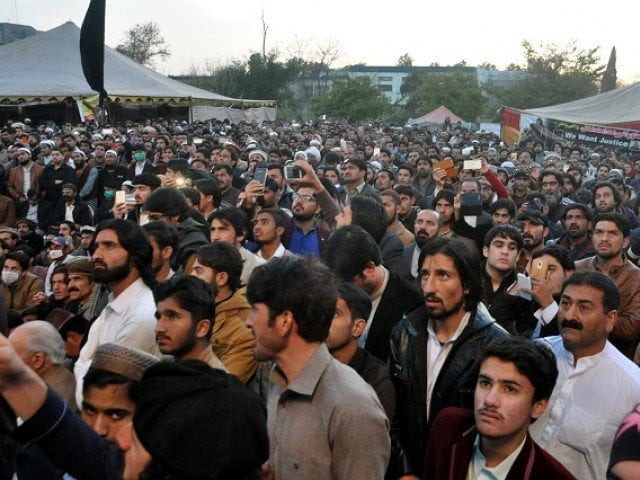Pashtun sit-in — a new political awakening?
This sit-in is indicative of the emergence of a new form of politics of belonging and resistance

This sit-in is indicative of the emergence of a new form of politics of belonging and resistance. PHOTO: FILE
This sit-in is indicative of the emergence of a new form of politics of belonging and resistance that has been brewing in the Pashtun region for over a decade now. Spearheaded by the educated Pashtun youth, this new form of identity politics is informed by and anchored in the individual and collective experiences of Pashtuns in the distinct socio-political milieu of the post-9/11 world. These are Pashtuns who have personally experienced humiliation, displacement, unlawful abductions and detentions, ethnic profiling and stereotyping, and lost dear ones in military operations, terrorist violence and drone attacks over the last 15 years. The tormenting personal and collective experiences of these people were made worse by the indifference and apathy of the mainland Pakistan towards their plight, creating strong feelings of resentment and marginalisation. While nearly all classes and sections of the Pashtun society have been affected by terrorism and the concomitant politics of fear and discrimination, Pashtun labourers, students and salaried class have borne the brunt of the crises. One of the most important outcomes of these experiences has been the politicisation of previously apolitical constituencies and groups in the Pashtun society. In this regard, the case of the educated Pashtun youth is a fairly interesting one and pertinent to the subject under discussion.
Young Pashtuns pursuing studies in major urban centres of the country were at the forefront of the Pashtun society’s interaction with the outside world in the post-9/11 world. Hailing predominantly from middle and lower middle class backgrounds, these young Pashtuns not only personally experienced ethnic profiling and discrimination but were also forced by their circumstances to make sense of the situation in their region and come up with an informed explanation. The proliferation of digital technology and social media enabled them to connect with the Pashtun youth from other parts of Pakistan who were also going through a similar crisis of belonging. The shared experiences of negotiating through this crisis have led to the emergence of a new political consciousness that seeks recognition, fair treatment and peace for Pashtuns within the federal framework of Pakistan. Unlike the old nationalist thinking, this new consciousness doesn’t draw inspiration from abstract references to Pashtun ethnicity, homeland or golden past. Nor does it take pride in the orientalist myths about Pashtun bravery, invincibility and hospitality. Instead, this new thinking is rooted in the actual social and personal experiences of Pashtuns in the post-9/11 world. This breed of Pashtun political activists may not feel strongly about the Durand Line but it clearly wants to revisit the current relationship with the Pakistani state. They don’t want to continue living as second class citizens. They want a fairer and more critical engagement with the state and its project of Pakistani nationalism. They are unequivocally clear in their criticism of the hegemonic narratives of the state and the role of its ill-advised adventurous policies in creating and sustaining the menace of terrorism.
Moreover, this emerging political consciousness also indicates growing dissatisfaction with traditional Pashtun leadership, including Pashtun nationalist parties which have failed to come up with a clear and effective political plan and programme to steer the Pashtun region out of the current crisis. Their hollow slogans and empty condemnations are becoming increasingly irrelevant.
The Islamabad sit-in is the first proper sign of the growth of this new politics among the Pashtun youth. This protest movement was initiated, and is being successfully managed, by the Pashtun youth without the backing from any major political party. As the sit-in is entering an eighth day, it has remained completely peaceful, busting all myths about Pashtuns in general and people of tribal areas in particular.
While patience and maturity of the participants of the sit-in is commendable, the apathy shown by mainstream media and the government is shameful. Media has for long defended its non-coverage of the issues of Fata on grounds of non-accessibility. Now when the people of tribal areas have marched all the way to Islamabad to get their voices heard, media and the government have ignored them completely. This apathy is deplorable when compared with the response of the state and media to other recent sit-ins and protests. The lesson that the protesters are being taught is that the state only understands the language of violence — an idea with potentially dangerous implications for national integrity.
Whether this protest translates into a sustained political movement and force of resistance depends mainly on the ability and capacity of the educated Pashtun youth to overcome the constraint of organisation. The current sit-in is an encouraging development but it has not yet acquired the shape of a sustainable social movement. One-off sit-ins can’t effectively address longstanding structural issues. Instead, only organised and sustained political struggle can help address such issues. Anyhow, regardless of the outcome of the sit-in, it has rekindled the question of what it means to be a Pashtun in the 21st-century Pakistan.
Published in The Express Tribune, February 8th, 2018.
Like Opinion & Editorial on Facebook, follow @ETOpEd on Twitter to receive all updates on all our daily pieces.














COMMENTS
Comments are moderated and generally will be posted if they are on-topic and not abusive.
For more information, please see our Comments FAQ